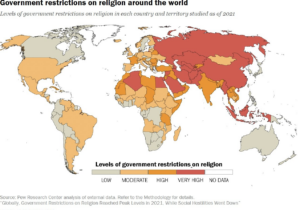Even as partisan divides have become seemingly intractable across a wide array of issues, the promotion of international religious freedom remains one of the bipartisan bright spots in Congress. On February 29, one such bipartisan group of Senators introduced a resolution calling support for international religious freedom a “cornerstone” of U.S. foreign policy, while highlighting the many countries around the world where religious freedom conditions have deteriorated in recent years.
The resolution, S. Res. 569, if passed, would be one of the most comprehensive statements by the Senate in recent years focused on international religious freedom.
The modern framework for the U.S.’s promotion of international religious freedom began with the International Religious Freedom Act of 1998 (IRFA), passed unanimously in the then-Republican-controlled Senate and signed into law by President Clinton. More recent related legislation has expanded the tools available to sanction countries and non-state actors, holding them accountable for severe violations of the right to religious freedom.
Unfortunately, presidential administrations across both parties have been hesitant to use the full range of sanctions, especially those which go beyond typical naming and shaming and have real economic teeth. The Senate resolution appropriately pushes back on this lack of executive action, calling on the State Department to make the promotion of religious freedom an “utmost priority” and to “leverage all diplomatic and sanctions tools available” that Congress has provided. Those tools include a wide variety of economic sanctions against violating countries, as well as targeted sanctions against particular individual bad actors.
While the Senate resolution calls for greater use of sanctions tools, it praises the development of recent “robust” multilateral engagements with international partners. Those new partnerships include the annual Ministerial to Advance Religious Freedom and the creation of the International Religious Freedom or Belief Alliance, begun during the Trump administration and continued into the Biden administration. That Alliance now has 37 member states committed to the defense of religious freedom.
The U.S. must continue to lead on the promotion of international religious freedom, as the resolution paints a disturbing portrait of religious freedom conditions around the world.
In China, Uyghur Muslims face a genocide, with over a million still imprisoned in “re-education camps” and horrifying stories of forced sterilizations and abortions against Uyghur women.
In Nigeria, militants target Christians for slaughter by the thousands each year, as well as Muslims considered “un-Islamic.” Blasphemy laws in the northern part of the country call for the death penalty, as in the case of Sufi Muslim Yahaya Sharif-Aminu, who faces the death penalty for song lyrics that were viewed by some to be offensive to the Prophet Muhammad.
The Ortega regime in Nicaragua has led a continuing campaign against the Catholic Church because Catholic religious leaders viewed it as their religious duty to call out the crimes and human rights violations of the regime. Bishop Rolando Álvarez was sentenced to 26 years in prison for his preaching until he was sent into exile recently.
Pakistan’s religious minorities face an epidemic of mob violence, forced marriages and forced conversions, and other sexual violence because of their religious identity. One Pakistani Christian survivor, who was abducted at the age of thirteen, described her ordeal: “They put a paper in front of me and told me to sign it. I was later told that I was now a Muslim, and I could not go back to my home. I started screaming. I said I wanted to go home. They took out a gun and threatened me, intimidated me. They then locked me up.”
Those are only a handful of the many countries and regions where the gravest crimes are being committed, with increasing frequency, simply based on individuals’ faith.
In its endorsement of S. Res. 569, the bipartisan U.S. Commission on International Religious Freedom highlighted that the resolution was introduced on the 25th anniversary of the International Religious Freedom Act of 1998: “In too many countries, individuals and communities are targeted for their religious beliefs, activity, or identity, or for their religious freedom advocacy. Those individuals and communities are why IRFA was enacted. They also are why global efforts to promote freedom of religion or belief for all remain essential today and in the future.”
While Presidents in recent years have paid more attention to international religious freedom, they have fallen short in using the full panoply of tools available in U.S. law to turn the tide against the growing persecution happening around the world. On the 25th anniversary of the International Religious Freedom Act, this new Senate resolution provides a necessary reminder and corrective that greater action is needed. The Senate should quickly pass this resolution and reaffirm the worldwide promotion of the fundamental right to religious freedom as an “utmost priority” for the United States.






 Sponsor a student for Christianity & National Security 2024
Sponsor a student for Christianity & National Security 2024